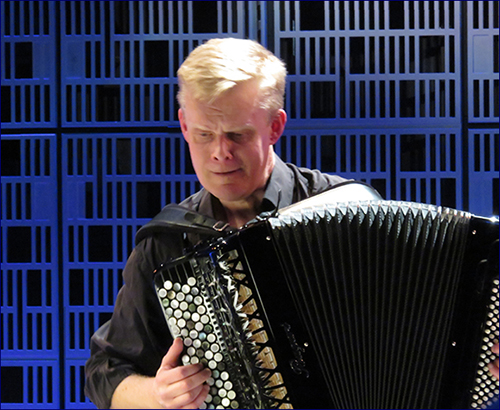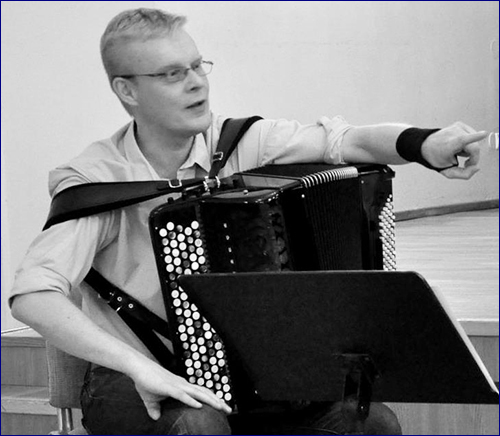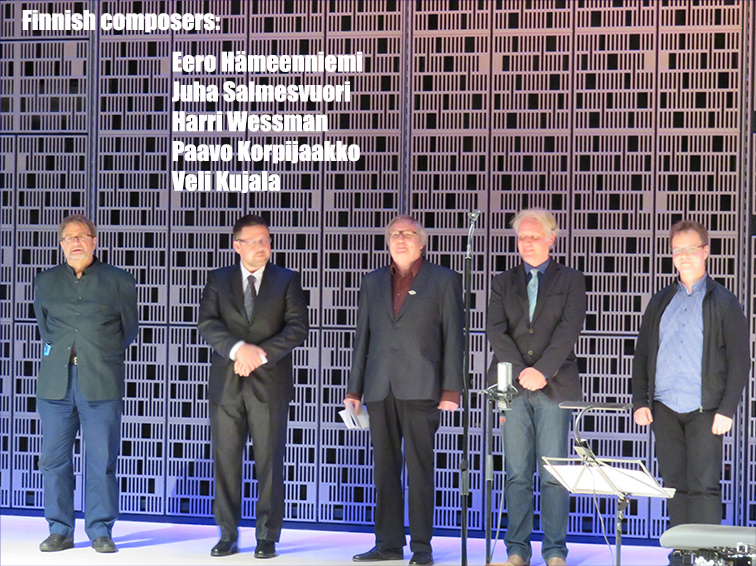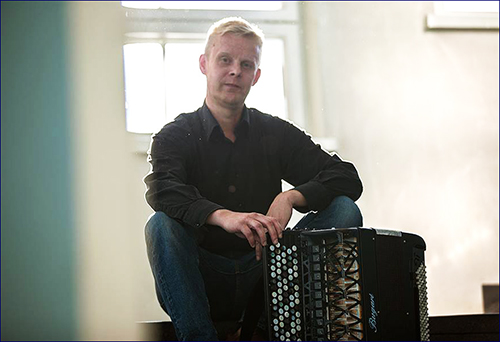|
 |
I have heard you perform some truly magnificent concerts, such as the Bach concert in Ikaalinen some years ago, your performance at the Coupe Mondiale in Turku and now this one in Helsinki. How do you prepare to go on stage and what are your priorities when you perform? Are you thinking about the music, the composer, the audience?
|
|
 |
 While appreciating the support of the audience, without being impolite, when performing, I'm not focused on the audience. It's not the audience that serves as a motivation. I'm not so focused on the reaction of the audience. To me, as performer I do have other responsibilities. While appreciating the support of the audience, without being impolite, when performing, I'm not focused on the audience. It's not the audience that serves as a motivation. I'm not so focused on the reaction of the audience. To me, as performer I do have other responsibilities.
For me, performance is probably more and more like a dialogue between myself and the works, almost like a private conversation, where the audience is observing what is happening.
There was a time when I was 20 years old, when performance was more about the three people.. me, myself and I. I think that is normal in one's development, where you go through this egoistic stage and one thinks of how great they are and how fast they can play. This is normal, but if we stay like that, then nothing happens.
As time goes on, more philosophical values start to become important, at least with me. As I once stated in an interview, a Concert is just a destination, but I actually like the journey. The destination is the result of the travel and the actual hours that I'm on the journey are much more important. It's these hours that are the ones that I have learned to enjoy. It's when the most private things happen.
Performing is very profound. It's not just having talent and taking a score and learning it. To really learn a piece requires much research and the more I worked with composers the more I started to understand how profound they were in their construction of the pieces. The composer's inspiration has to be there, but there also has to be tremendous skill. It's like an architect who ensures that all the details fit into the building or to a room.
It can take years to really learn a piece. Even though you could maybe learn it quickly, I've started to believe that to perform a piece really well is very process. When we perform on stage, we show the outcome of the process.
I don't perform so often any more, but when I do, I try to perform something that hasn't been heard before otherwise I would be repeating myself. When I look at myself, I think I'm still developing. To me, this concert was better than the concert I presented in Turku for example, in 2015.
So, it's not the audience, it's not the dollars, it's something else. I have even declined to play some concerts because I realized that in fact, I had nothing to say. I will play this all Finnish program a few times and that will be it. As another example, after preparing the Goldberg Variations, I performed it only 10 times.
|
|
 |
Over decades of performing and recording, you consistently perform at such a high level? How are you motivated to always strive for excellence?
|
|
 |
As I mentioned, it's the journey that is more important than the destination. When arriving at one destination, I start heading to another one. To me, it's more like challenging myself to do something that I hadn't previously considered possible.
I have a very strong psychic. I can withstand a considerable amount of stress, and for example have never had a memory blackout in my career which now consists tens of different programs. Luckily the psychological things within me are quite strong, almost in a Zen or Buddhist kind of way. Its in my mind.
I'm not sure how other people deal with it, or react. I can of course guess, but I just know what happens in my own mind and how these things relate to my situation. For some other people, it might sound unnatural, but for me, I was born like this.
|
|
 |
You are still teaching at the Sibelius Academy in Helsinki and more recently as well in the University of Applied Sciences (TAMK) in Tampere. In addition, you also present Master Classes in various countries around the world. How big a part of your career is your teaching work at the moment?
|
|
 |
 These days, teaching is becoming the most important part. I've been thinking for years that when I have this 50th celebration, something will change. I started to prepare for this project a couple of years ago already and in addition, I'm decreasing the number of performances. These days, teaching is becoming the most important part. I've been thinking for years that when I have this 50th celebration, something will change. I started to prepare for this project a couple of years ago already and in addition, I'm decreasing the number of performances.
When we are preparing these types of concerts and new works, we are always alone and so its not a social way of living. I calculated that I've practiced well over 50,000 hours in my life and all these hours, we are alone. It can complicate the psyche when you are always by yourself. On the other hand, teaching is a social activity. It's an intellectual activity. It's a dialogue, it's not just giving information. I really want to focus more and more on teaching.
I also think it's a responsibility. I can say finally, that I know a bit about playing. Its time to pass everything to next generation – and trying them not to make same mistakes done in past.
At 50, one never knows how long we have, so I believe that this information should be passed on to others while we can. I just like teaching and I'm very fortunate to have such students as I do, ones of the highest caliber. It's really rewarding to be able to work with that kind of talents.
|
|
 |
Over the years, winning competitions has been one way of defining the culture of success. How would you define success today?
|
|
 |
I'm not so much for competitions. There are incredibly fine musicians, the elite, who make a living from concerts, who have not participated in competitions. On the contrary, we have a lot of competition winners who are lost.
I think competitions are okay as a short term motivation and to learn some things. For the competition itself, I look at it from the outside of the accordion society. They don't give anything. In my resume, I haven't mentioned anything about competitions for the last over 20 years or so, because what matters more, are the premieres and recordings.
I think for the serious musician, when they study at the Academies they study next to composers, theorists, conductors, cellists, violinists and that means something. You make the first premiere, and then this leads to the next.
Without the likes of Sallinen, Kaipainen and many other composers, my career wouldn't have developed the way it did. It's not a career like the other instrumentalists in regards to the opportunities that are available, but for accordionists it's still rather excellent. These moments help create respect for the accordion from the general music society. The grants and funding I have received is because that the work I have done is visible in the general music world.
We can keep the past, we can keep the competitions, but unfortunately I can see that the students are just running backwards and forwards between competitions and not really planning what they could go on and achieve afterwards. They could add much more. Everyone has to make a living and competitions are not much good for that.
In regards to Competitions, I am also very concerned about the competence of the Jury members. Now in this day and age, when all the young players begin to be academic, I wonder how in the world my students can be evaluated by people that don't even have an academic musical degree. I can say this, because I see things and I speak very openly with the younger generation about their opinions, their fantasies, their frustrations and so I know it. 90 or 95% of the participants in the competitions, could actually critique the members of the Jury.
Here at the Helsinki Music Center we just hosted the Fourth International Maj Lind International Piano Competition. The President of the Jury was Dmitri Baškirov with fellow Jury members being invited from the elite of the piano field. Each of the contestants could bow humbly to each member of the jury because of what they have done in their careers and they believed what the jury said. Is the situation the same with the accordion?
I have sometimes been thinking that when I go to the International accordion competitions as a member of jury, I see a nice reception at the beginning of the competition for Delegates, Jury members and their partners etc.. that for the price of the reception and hospitality, they could have invited two or three people to be on the jury from anywhere in Europe. I think that this would be much more important.
Or, when asking for funding from the State or such, why not ask for extra Euros to pay for competent jury members? I have seen in our competitions jury members who can hardly read the score of what the contestant is playing. I personally will not send any of my students to competitions. Of course, they can go if they wish, but I do not encourage them, and will not, until I start to see Jury members that I and students can respect.. For now, that is not the case.
I have a great respect for the people who work hard in the accordion field, often with their own time and money to support the accordion. This is fundamentally very important, but we should not mix that with the competence that comes only with knowing the litterature and knowing the works.
Visa versa, the best pianists or Jury are not necessarily the best organizers, the best politicians, or the best supporters. These pianists are just focusing on their specific area of expertise, playing.
We understand that honest and sincere work for the accordion is fantastic, but within the accordion field, I think we should do something to not confuse this with competence to serve on an International Jury. With so many people around the globe complaining, I wonder if it is so complicated to find six or seven people for the Jury in this day and age. The chosen Jury should be music academics and every member of the Jury should have to have had presented at least a certain number of concerts and have a knowledge of our accordion repertoire and what is happening today.
I'm not trying to make enemies about this point, but at some point we need to begin and open this dialogue because both sides are blind in a way. The complainers don't see the positive work being done, but on the other hand, those people can't see the urgency behind the complaints. I think we need to open constructive conversation and if we begin it now, we would maybe get results in five years. As an example, talking to you as CIA members, the country which holds the Coupe Mondiale beginning five years down the road, could maybe be required to have different requirements, to address this important situation.
Hosts of the Coupe Mondiale for example, spend a lot of money on all the hosting, so why not invest part of that towards a competent Jury panel. I'm sure no one would miss the opening reception, if they knew the money was being put towards academic members of the Jury. It would be nice if an organization such as the CIA could begin this process. The hosting of the Coupe Mondiales for example has been great, but it's a bit like the hosting of the Olympics, each one almost trying to outdo the previous one.
Yet, with as little as 200 Euros, you could fly a Jury member from one side of Europe to the other, so it's not such a huge investment. I'm sure to support this positive development, there would even be Jury members who would do such work for very little, if it was invitational.
On this point, I don't want to be negative, but instead only wanting to open communication and offer solutions. At the moment, we are again in a situation where it's like riding a bike without the chain.
|
|
 |
You have given so much passion to working with Finnish composers, which is only natural when surrounded by the elite of the Finnish musical society. Are there non-Finnish composers that intrigue you?
|
|
 |
In Finland, we have such great composers. Great composers are found around the world of course, but since I'm am Finnish, and these compositions are commissions it's also nice to support National composers. I find it's much easier to find funding to support our National composers rather than ones in France or England for example, and so in a way its in my area. (I have, of course, also premiered works by non-Finnish composers).
Many composers today are based in southern Finland, so it is easy to collaborate with them. In addition, as I continue to develop my reputation among them, if I get a project, I can count on them to work with me. While it's not actually true, Kaipainen thought that I could play anything. So while it isn't true, it's still not bad to have such a reputation that is built over time. I guess I'm kind of Nationalist and probably that is how I'm going to stay.
|
 |
|
 |
What gives you the most pleasure as an artist today?
|
|
 |
 It's just learning. To see how far I can go. Somebody once stated that "to know what is beyond virtuosity, you first have to reach virtuosity." I believe there is something there. It's just learning. To see how far I can go. Somebody once stated that "to know what is beyond virtuosity, you first have to reach virtuosity." I believe there is something there.
When I look at some of the world's really top musicians, they have made it to a place. It's not just a level, it's a 'place' somewhere, a state of mind. Sometimes I see that they almost forget their instrument and it's like they are not there anymore. I want to see how far I can go. I want to know what old masters found, at least little part of it.
Everything takes time. I'm sure if I can continue performing for another 10 years, there will be another level again. It's all 'little by little' with small but regular steps. Playing, in a way, starts to be quite easy to me, but then other challenges arise. It goes from a more physical thing to a more philosophical, mental and psychological thing and then it's interesting again. The sound is much more profound that just planning how to pressurize the bellows for example. However, it's never ending such as the subject of research and how to make certain illusions which are sometimes almost not even possible on the accordion, but the illusions are.
Life is so short, that we may never achieve all, but that is what I try and share with my students, that one shouldn't always look at what they are today, but instead, what one can be tomorrow and beyond. In the long run, things can happen!
I remember that during my younger days of competition, there were very many big talents from the Soviet Union and different parts of Europe. Some of these people were more talented than myself. The difference however, is that I kept going. Many of these phenomenal talents have fallen by the wayside. Talent is definitely part of it, but it's not everything. I've heard joked that the difference between Mozart and Beethoven is obvious. Mozart came from Heaven, learned nothing, and returned to Heaven. Beethoven also came from Heaven, he learned everything and returned to Heaven. The outcome was the same. I think I'm a bit more of the Beethoven type, but I have been surrounded by a lot of Mozarts.
|
|
 |
You have had this 50th Birthday Concert in the works for some time, and now you have achieved this milestone. What would you like to accomplish that you haven’t yet?
|
|
 |
I do have a few things that I would like to do, but things of course don't depend on me only.
I'm working behind the scenes, all the time, so I always have something on my mind for the next year or two. Concerts don't really depend on me, as other people are organizing them. The same for recordings. I get ideas, but many of the ideas are never realized.
For this project I've been working rather hard, so for the immediate future, I don't have any concerts scheduled until the end of next year. It reminds me of once when I played the Goldberg Variations, and right afterwards someone asked me what is next? I was thinking, wow, I just finished this one, so I haven't given time to focus on the next one.
Composers are there and with Paavo Korpijaakko for example, we have some ideas - him composing biggest accordion solo work of all times.
But about those plans, lets talk again in 10 years. Finland 110 - Väyrynen 60 in 2027.
|
|
|
|
|